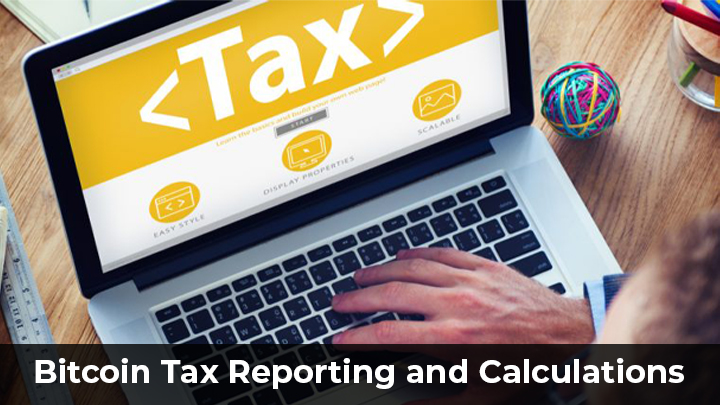Learn step by step process of Bitcoin tax reporting and its related calculations.

Essentially, cryptocurrency is a form of virtual currency that uses strong cryptography to encrypt financial transactions and regulate currency output, because cryptocurrencies are created using blockchain technology, they are not regulated by any central entity. The most famous cryptocurrency today happens to be Bitcoin. These can be stored and accessed via a mobile or desktop in a digital wallet.
Bitcoins: A Brief Introduction
Bitcoin is widely recognized to hit the market as the first, and most common cryptocurrency. It was planned and created under the name of Satoshi Nakamoto, by a pseudonymous person or group of individuals. The true identity of Nakamoto remains uncertain until this day. No actual coinage is used. Instead, the balances on a public ledger are maintained. Also there are a plethora of Bitcoin tax calculators to choose from, so one can calculate accurate amount.
What Are The Characteristics Of Bitcoins?
Listed below are the unique characteristics of bitcoins and other cryptocurrencies that make them stand out in the world of financial transactions.

Elimination Of Paperwork:
You don’t require any documentation to make transactions with Bitcoin. You don’t need an ID card or an address evidence that standard banks normally ask you to provide before you open an account. You just need to download a Bitcoin wallet program in this situation and create your Bitcoin address.
Transactions Are Fast:
In a Peer to Peer network there are no intermediaries, Bitcoin enables transactions to be executed quite quickly.
Transaction Are Irreversible:
Bitcoin transactions are permanent due to Bitcoin’s Peer to Peer network, with no intermediaries. Be certain to verify the details before authorizing your transaction.
It Is Cost-Effective:
The reality that this is a cost-effective form of transaction is a big point in favor of Bitcoin. In the absence of intermediary entities, information is transmitted and obtained between computers in the P2P framework.
Understanding Bitcoin Taxes:
According to the Internal Revenue Service (IRS) rules, Bitcoin is to be handled as property and not as tax money. This also refers to other cryptocurrencies, such as Bitcoin Cash, Ethereum, etc.
Bitcoin is regarded as a type of real currency, such as gold, real estate, stocks, etc. In other terms, when you invest in Bitcoin or other cryptocurrencies you will also need to disclose the capital gains and losses that are realized. Failure to do the same would leave you vulnerable to IRS fines for tax evasion. The increase in the value of the investments is known as a capital gain. Typically, you have to pay the capital gains tax. In comparison, a capital loss relates to a drop in the value of the capital asset. A capital loss decreases the income paid on the tax return.
How to Calculate and Report Bitcoin Taxes?
After the implementation of the new law, bitcoin tax reporting is something that needs to be done mandatorily.
Following are the steps involved in bitcoin tax reporting.
Taxable Events:
Before understanding the steps involved in bitcoin tax reporting, it is vital to understand what are taxable and non-taxable events.
Following are situations that considered as taxable events:
- Exchanging bitcoins or other forms of cryptocurrency for fiat currencies
- Buying goods and services with cryptocurrency
- Exchanging one form of cryptocurrency for another
- Cryptocurrency mining
Following are situations that are viewed as non-taxable events:
- Receiving third party cryptocurrency
- Purchasing cryptocurrency with USD
- Transferring of cryptocurrencies from one wallet to another
The cost basis relates to how much money you’re spending on the assets. Regarding bitcoin and other cryptocurrencies, it usually requires the selling price along with the extra costs that come with purchasing the Bitcoin. In general, these additional expenses include trading commissions from the exchanges on which you buy the cryptocurrency and payment fees.
The formula mentioned below can be used to calculate the cost basis
(Purchase Price of Crypto + Other fees) / Quantity of Holding = Cost Basis
Calculation of Capital Gains And Losses:
To measure your capital gain or loss, you must deduct the cost basis from the selling price or the current market value.
Fair Market Value – Cost Basis = Capital Gain or Loss
Bitcoin Tax Reporting:
For Bitcoin tax reporting you need two forms. They are, Schedule D 1040 and the form 8949. The form in Schedule D lets you record your capital gains on your personal property. It covers inventories, cars and so on. For each Bitcoin transaction you made during the year, you can use Form 8949 to list the capital gains made on each deal. Summarize these and announce the total on the 8949 form at the bottom, and move the total to the 1040 Schedule D form.
Considering the abstract nature of cryptocurrencies, crypto traders tend to assume they can trick the system and bypass Bitcoin’s daunting tax reporting method. This is far from the facts though. Recently the IRS has started to take strict action against traders who would stop bitcoin tax reporting. The IRS sent over 10,000 letters to cryptocurrency holders warning them of harsh penalties if they attempted to stop paying cryptocurrency tax.
Hence, it is wise for cryptocurrency holders to adhere to the new law that has been implemented and to strictly follow the bitcoin tax reporting process to avoid penalties and problems in the future.
